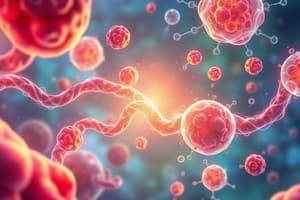Podcast
Questions and Answers
What are the molecules upon which enzymes act called?
What are the molecules upon which enzymes act called?
- Products
- Catalysts
- Substrates (correct)
- Reactants
What is the study of enzymes called?
What is the study of enzymes called?
- Enzymology (correct)
- Biochemistry
- Enzymatics
- Catalysis
What is the unique three-dimensional structure of an enzyme responsible for?
What is the unique three-dimensional structure of an enzyme responsible for?
- Lowering activation energy (correct)
- Altering the substrate
- Increasing equilibrium of a reaction
- Changing the products
How many biochemical reaction types are enzymes known to catalyze?
How many biochemical reaction types are enzymes known to catalyze?
What distinguishes enzymes from most other catalysts?
What distinguishes enzymes from most other catalysts?
What is the unique property of orotidine 5'-phosphate decarboxylase as mentioned in the text?
What is the unique property of orotidine 5'-phosphate decarboxylase as mentioned in the text?
What are catalytic RNA molecules called?
What are catalytic RNA molecules called?
What is the field of pseudoenzyme analysis focused on?
What is the field of pseudoenzyme analysis focused on?
What is responsible for an enzyme's specificity?
What is responsible for an enzyme's specificity?
What is the main role of enzymes as biological catalysts?
What is the main role of enzymes as biological catalysts?
Flashcards are hidden until you start studying
Study Notes
Enzymes
- Substrates are the molecules upon which enzymes act.
- Enzymology is the study of enzymes.
- The unique three-dimensional structure of an enzyme is responsible for its specificity.
- Enzymes are known to catalyze over 4,000 biochemical reaction types.
- Enzymes are distinguished from most other catalysts by their high degree of substrate specificity.
- Orotidine 5'-phosphate decarboxylase has the unique property of being one of the most proficient enzymes, releasing almost all of the energy available from the reaction.
- Catalytic RNA molecules are called ribozymes.
- The field of pseudoenzyme analysis is focused on identifying and characterizing proteins that resemble enzymes but lack catalytic activity.
- An enzyme's specificity is responsible for its ability to catalyze a specific reaction or set of reactions.
- The main role of enzymes as biological catalysts is to increase the rates of chemical reactions in living organisms.
Studying That Suits You
Use AI to generate personalized quizzes and flashcards to suit your learning preferences.



